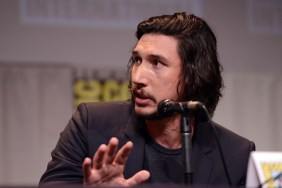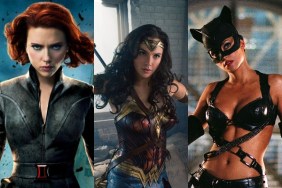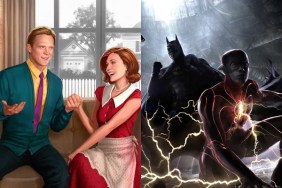It’s not news, but it sure feels new: the movie studios that used to dominate the Comic-Con conversation, the ones that flooded Hall H with non-stop previews and high-profile announcements, they just aren’t here anymore.
Granted, Hollywood hasn’t abandoned Comic-Con altogether. Warner Bros. and Marvel Studios – the caretakers of some of the geekiest (and most successful) movie franchises in history – both have major presentations scheduled for Saturday. And a few smaller panels have been scattered throughout the weekend, including one for Luc Besson’s ambitious new comic book adaptation Valerian and the City of a Thousand Planets and one for Oliver Stone’s new biopic Snowden… for some reason. Whether the filmmakers assumed that every Comic-Con attendee is a hacker or whether they just thought their film would provide a much needed dose of reality amidst this sugary diet of make believe, it sure as hell plays like weird counter-programming.
There will always be a place for exciting new films to try to find their audience at Comic-Con, but this event is about so much more than that. Comic book conventions got their start as a way for people to come together and share in their existing passions, not to be sold on something. You can argue all you want that the absence of “big movies” in Hall H – from the studios that sat this one out, like Universal and 20th Century Fox – has left a void that “big television” immediately filled. On the surface it may even seem like a lateral move now that Hall H, the biggest venue at San Diego Comic-Con, is now mostly being used to promote TV shows like The Walking Dead, South Park, Preacher, Star Trek, Supernatural and Sherlock.

Kevin Winter/Getty Images
Also: Comic-Con 2016 | Marvel Debuts Trailers For ‘Luke Cage’ & ‘Iron Fist’
True, these aren’t plucky independents. They are, indeed, their own institutions. But in keeping with the Comic-Con spirit they are ongoing stories that have already inspired a faithful following. Audiences aren’t flocking to see the Game of Thrones panel just to witness a bunch of mystery trailers or find out which surprise celebrity will show up. They aren’t flocking to see if Hollywood is about to do right by or screw up the latest intellectual property acquisition. They’re flocking because they are already invested in the tales being told by Game of Thrones. If any news comes out of it, awesome, but if not, we still all luxuriated in the good vibrations that emanated from a room full of people who just like the same nifty things.
Comic-Con is a major economic event in the geek community. Companies put up booths to sell their wares and promote their products. But it’s not supposed to be an industry event, it’s supposed to be a fan event. It’s supposed to reflect what the audience already cares about. In that way it’s a reasonably democratic system: if the fans don’t care about something, then it probably won’t get its own panel. Everyone loves Star Wars, so that gets a panel. Not everybody loves the 1984 animated series Turbo Teen, so that one doesn’t.
But for years, the focus has shifted to films that might, potentially, one day, if they’re good (and not always then) find their audience. We’ve spent so much time covering, previewing, speculating about, editorializing about, describing footage from, and interviewing celebrities from lame non-starters like The Immortals, Stealth, Twixt, Flyboys, and even good/great non-starters like Tron: Legacy, Warcraft and Scott Pilgrim vs. The World (to name a very small number of both), that we may have lost sight of the fact that Comic-Con should never have turned into a such a huge publicity event in the first place.

Kevin Winter/Getty Images
Storytellers of every stripe should be using Comic-Con 2016 to interact with their fans, not to constantly pitch them stuff. Granted, it’s easier to pull that off in serialized mediums like comics, television and video games. But when audiences have a huge emotional investment in an ongoing series of films – like the Marvel Studios movies, the DC superheroes, Harry Potter and so on – that makes sense too.
The paltry Hollywood offerings in Hall H this year – and for the most part, across the board – are offering the fans a refreshing breather, and a reminder that Comic-Con was already wonderful before it came part-and-parcel with a torrential downpour of trailers and stunts. It’s a great place to be a geek. It’s not a place to be a member of Hollywood’s test market, where they shove everything they can in front of your face in the hopes that just one of them gets 300 levels of free publicity.
We’ll find out next year if the lack of movie panels in Hall H was a glitch in the system or the new status quo. I suspect that at least some of the studios will be looking closely at the coverage of the event, and to the social media discussions, to see if journalists and fans will apologize for taking their presence for granted, and if all the attendees vow to stop treating Hollywood’s Hall H panels like a commodity to be pirated. (Piracy which should never have happened. It’s wrong and you know it’s wrong, even if you do it.)
But I think the opposite is likely to happen. Everyone I’ve talked to at Comic-Con so far, the press and the fans alike, have been breathing more easily because of the film industry’s absence. There is a lot less pressure to get into panels you may not even like. There is a lot more incentive to see something more intimate and personal. And, so far at least, everyone seems to be having a lot more fun.
Top Photo: Albert L. Ortega/Getty Images
William Bibbiani (everyone calls him ‘Bibbs’) is Crave’s film content editor and critic. You can hear him every week on The B-Movies Podcast and Canceled Too Soon, and watch him on the weekly YouTube series Most Craved, Rapid Reviews and What the Flick. Follow his rantings on Twitter at @WilliamBibbiani.








